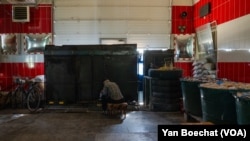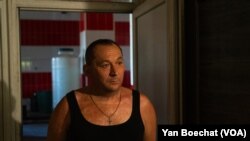Firehouse
VELYKA NOVOSILKA AND KUPIANSK, UKRAINE — An antique turntable plays a 1954 record on the ground floor of the firehouse.
Andriy, 50, a former firefighter, invites me for a quick waltz.
Over the music, we hear bombs blast out of town aimed at Russian soldiers more than 10 kilometers away. In a nearby neighborhood, deep gray smoke billows out of a burning home.
Earlier in the day, Russians fired two shells back into the Ukrainian town of Velyka Novosilka, striking near Andriy's parents' house and starting the fire. Now he wears body armor over his black tank top. We are near Ukraine's southern front line, known as "the counteroffensive," but nobody died here today.
A town small enough to be called a "settlement," Velyka Novosilka was once home to thousands of people. Now it's an overgrown expanse of bombed-out houses and government buildings. As we drive through, one Ukrainian soldier jokingly calls it a "zombie wasteland."
"Nowadays it is much quieter," says Andriy, with drops of sweat on his forehead from dancing. "There are only six or seven bombings a day."
Post Office
Six hours by car and worlds away in the Ukrainian city of Kupiansk, on the northeastern end of the warzone, Russian bombs fall more frequently, from increasingly shorter distances. At a post office on the "wrong" side of town — the side nearest to the Russian lines — residents slip in with packages to post, or to pick up their paychecks.
The Ukrainian government is sending Kupiansk's pensioners checks three months in advance, according to postal workers, because they know the mail service may end soon.
Inside the packages that residents carry into the post office are electronics, mobile phones, clothes and other precious items, all addressed to cities in Ukraine that are far from the battles, where the senders hope to settle after evacuating Kupiansk.
"I planted a garden," says Nina, 64, after dropping off a box of her valuables to send to family in western Ukraine. "I thought things would stabilize, but my hopes have faded."
Firehouse
Back in the firehouse, near Ukraine's southern front, the war is slowly moving down river, away from Velyka Novosilka. For the scores of people living in the basement of the firehouse, the moving battle line—whatever the pace—means they may one day resume normal life in their beloved town.
Andriy and Sergii, 54, the former fire chief, are de facto leaders of the firehouse. They organize humanitarian aid packages delivered by volunteers who drive into battle zones with items like pasta, cookies and soap. But the deliveries never include two things desperately needed at the firehouse: coal to heat the building in the winter, and a vehicle to evacuate sick people to the nearest hospital several towns away.
As the faint crackly music wafts through the hallway, Andriy and Sergii show us treasures they have gathered in the firehouse during the war like coins from the time of Peter the Great and paper money from 1917, the year the Russian Empire collapsed.
They collected some of the items in pre-war years and found others with a metal detector that looks like it was made at least 30 years ago. There are also cherished antiques donated by those living downstairs in a single room lined with dozens of beds and no windows.
"When this war is over, we may open a museum," says Sergii. People are not yet returning to Velyka Novosilka, he adds, but those who remained throughout the war have no plans to leave.
Post Office
But in Kupiansk, many among the less than 30% of residents who remain are planning their escape.
Some residents left when Russia took over in February 2022. Others fled during the occupation on buses to Russia, as Ukraine re-took the city a year ago. Now, in the mornings, evacuation vans travel from neighborhood to neighborhood, picking up families, despite ongoing shelling.
The Ukrainian government investigates evacuees on their way out, searching for "collaborators" among fleeing people, according to aid workers.
"Security services check everyone," says Sergey Novikov, 29, a volunteer traveling through the city to pick up families. "They have a list of collaborators."
But at a military look-out point near the center of the city, fighters say sorting out who supports what side in Kupiansk is not always a simple matter. Only 20 kilometers from Russia, most people in Kupiansk have friends and family on both sides of the border, and anyone who worked for the Russian occupiers could be a suspect.
"If they had a 'government' job during the occupation, even as a teacher, they could fear being accused," says Maxim, 25, a soldier. "People I knew, even friends, evacuated to Russia."
At the post office, employees say they will stay in Kupiansk as long as drivers can bring the mail to and from the regional office. But bombs crash onto their block almost every day and they expect it won't be long before it gets worse.
When or if that time comes, postal workers say they will flee with other residents. Life under occupation was dismal and they do not want to do it again.
"There was no water or electricity," says Svitlana Oleynikova, 45, the post office manager. "We were cooking on an open fire on the streets in the middle of winter."
Firehouse
By afternoon at the firehouse, Andriy and Sergii offer to show us the neighborhood. The blast of outgoing artillery fire has quieted and we cannot see the burning house from the firehouse parking lot. Andriy does not put his body armor back on.
A small, white and brown limping dog toddles alongside the men as they walk down the street. The roads are littered with bits of broken homes and branches from fallen trees and bushes. There are no moving cars or people.
We stop at one home, and photographer Yan Boechat peers into the overgrown garden, looking for unexploded mines before gingerly stepping in. A neighbor was buried here after being hit by shrapnel. A single, rusted nail holds the two pieces of wood that make the cross on his grave.
On the way back, Sergii talks about recovery. The firehouse roof needs to be repaired to keep residents warm in the coming winter— that is, if they can get enough coal for the heaters.
An occasional dance, a future museum and just a little less bombing portend a brighter future, adds Andriy. But daily artillery strikes make it too dangerous to ask anyone to fix the roof right now.
"It will just have to wait," he says.
Stanislav Storozhenko contributed to this report.








